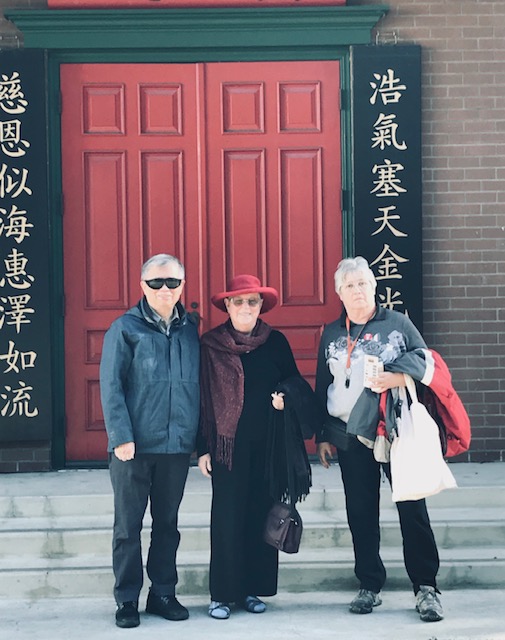By Alison Woolpert, Member of Yuki Teikei Haiku Society (YTHS)

Roger Abe set up a wonderful tour of the Chinese American Historical Museum in History Park San Jose. The museum building, a reconstruction of the original 1888 Ng Shing Gung Temple or “Temple of the Gods,” served the Chinese community as a cultural center.
Docents Brenda Hee Wong and Anita Wong Kwock explained that the two-story brick building was used not only as a meeting place, but also as a school where children could study calligraphy and the Chinese classics, a hostel, and a place to worship. The upstairs temple houses the original carved and gilded teak wood altar that has been lovingly restored. Along with the many artifacts of daily life and celebrations showcased downstairs, there is a pictorial timeline starting in 1850 to the present that shows what was going on in the USA, San Jose, and China.
Following the tour, members spent time in History Park and later gathered at the Markham House to share our haiku from the day.
Attendees: Roger Abe, Patricia Machmiller, Philip Hsieh, Linda Papanincolaou, Eleanor Carolan, Joan Zimmerman, Amy King, Carolyn Fitz, Marilyn Gehant, Noreen Brennan, Clysta Seney, Mimi Ahern, Carol Steele, Alison Woolpert

Haiku Poetry and Testimonials from YTHS Tour Members
It was a thrill to be in the haiku group with Roger Abe (YTHS) on our recent visit to your beautiful Ng Shing Gung temple museum. Your collection is so rich. I appreciate the splendor of the temple area. Downstairs I was especially intrigued by the schoolroom exhibit, the clothes, and the pottery, all of which give such a strong sense of lived lives. I can only imagine their joys and sorrows, but more clearly now, thanks to your museum.
You expressed an interest in the haiku that some of us wrote. You will have noticed that we write "modern" haiku as well as the classical 5-7-5 syllables. But we do try to include an indication of season. Below are the two haiku that I read. In the first one "blossom" suggests spring. In the second one, "first meal" suggests the New Year.
broken blossoms
the finger-length lotus shoes
for bound feet
first meal
scratching his name
on his new rice bowl
Best wishes,
(Joan) Zimmerman

Great presentation!
two children
board the winter trolley—
double happiness
a stranger finds rest
at the feet of spring mountains
Temple of Five Gods
Roger Abe

Very insightful tour of Ng Shing Gung, Temple of the Gods. My haiku:
year of the rat
we take the stairs to the Temple
of the Five Gods
I look forward to returning to Ng Shing Gung in the future to spend more time.
Alison Woolpert

The Saturday tour was a very memorable event. The museum that you have created is certainly well done; what an asset to the San Jose community you have provided.
Here are some haiku that I wrote reflecting on the day:
the colorful head
of a paper lion—
spring in a glass cage
decorated staves
of the Eight Immortals—
grand majesty orchids
red silk slippers
handmade for the newborn—
snow moon
Sincerely,
Patricia J. Machmiller